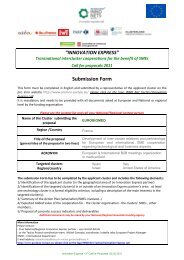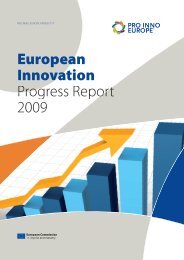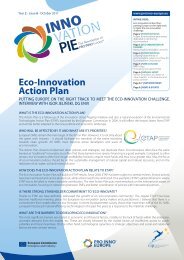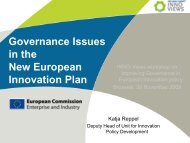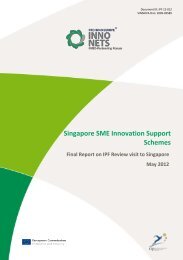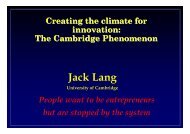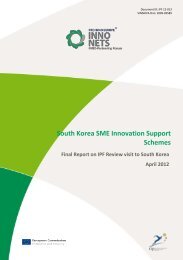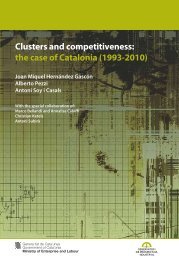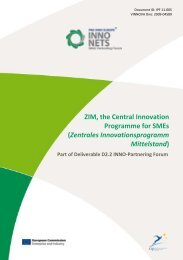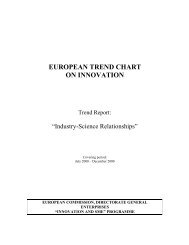The workshop in brief - PRO INNO Europe
The workshop in brief - PRO INNO Europe
The workshop in brief - PRO INNO Europe
Create successful ePaper yourself
Turn your PDF publications into a flip-book with our unique Google optimized e-Paper software.
<strong>The</strong> <strong>workshop</strong> <strong>in</strong> <strong>brief</strong><br />
Session 1: Sett<strong>in</strong>g the scene<br />
This session moderated by Keith Sequeira (Unit Innovation Policy Development,<br />
<strong>Europe</strong>an Commission – DG Enterprise & Industry) outl<strong>in</strong>ed ma<strong>in</strong> concepts of<br />
<strong>in</strong>novation culture and the importance of wider framework conditions and drivers for<br />
<strong>in</strong>novation.<br />
In her welcome address Ingrid van der Wacht (City of E<strong>in</strong>dhoven) emphasised the<br />
importance to develop an open <strong>in</strong>novation culture - e.g. by l<strong>in</strong>k<strong>in</strong>g design and<br />
<strong>in</strong>novation - as well as to address and <strong>in</strong>volve the public.<br />
Re<strong>in</strong>hard Büscher (Unit Innovation Policy Development, <strong>Europe</strong>an Commission –<br />
DG Enterprise & Industry) gave an <strong>in</strong>troduction <strong>in</strong>to the objectives of the <strong>workshop</strong><br />
discuss<strong>in</strong>g societal framework conditions driv<strong>in</strong>g or hamper<strong>in</strong>g <strong>in</strong>novation. Innovation<br />
culture is a key enabler but can also be a constra<strong>in</strong>t of <strong>in</strong>novation. Discuss<strong>in</strong>g new<br />
thoughts at <strong>Europe</strong>an level contributes to further broaden the already broad-based<br />
<strong>in</strong>novation strategy.<br />
Ian Miles (<strong>INNO</strong>-Grips project, PREST, University of Manchester) summarised the<br />
ma<strong>in</strong> f<strong>in</strong>d<strong>in</strong>gs of the <strong>INNO</strong>-Grips M<strong>in</strong>istudy on Innovation Culture. "Culture" is seen as<br />
multidimensional construct. Though there is much uncerta<strong>in</strong>ty about how to measure<br />
particular aspects of culture, and about which are most relevant to <strong>in</strong>novation, there<br />
is wide agreement on the importance of culture for creativity and <strong>in</strong>novation, for<br />
entrepreneurship and commercial exploitation of new ideas, as well as for diffusion<br />
and application of new products and processes. Public attitudes towards science,<br />
research, technologies, entrepreneurship and risk play an important role, beside<br />
topics like creative cities and <strong>in</strong>novation culture of organisations. Culture <strong>in</strong> creative<br />
cities is seen as attractor of creative workers. In this context, culture means “cultural<br />
<strong>in</strong>dustries” and tolerance, openness as well as diversity. Evidence can be found that<br />
organisational styles are associated with culture and trust as well as <strong>in</strong>novation level<br />
and <strong>in</strong>novation type of organisations. Management styles <strong>in</strong>fluence strongly the<br />
development of <strong>in</strong>dividual creativity and of creative environments.<br />
Hugo Hollanders (UNU MERIT) and Funda Celikel Esser (JRC, EC) analysed the<br />
l<strong>in</strong>k between socio-economic environment and <strong>in</strong>novation performance based on the<br />
06.10.2008 Page 9 of 34 <strong>INNO</strong>-Views WS 04 Output f<strong>in</strong>al






